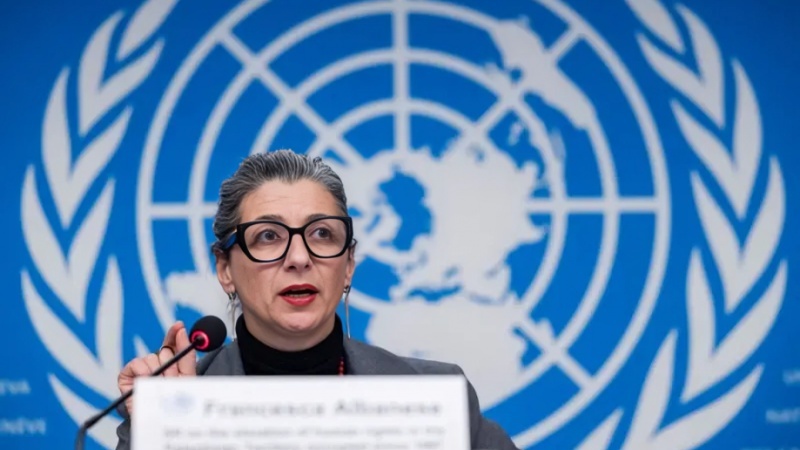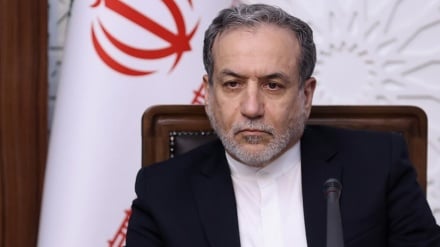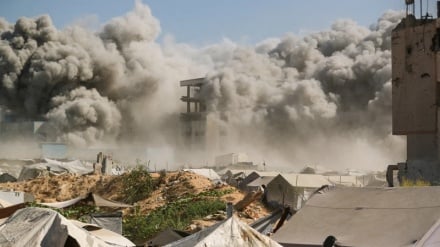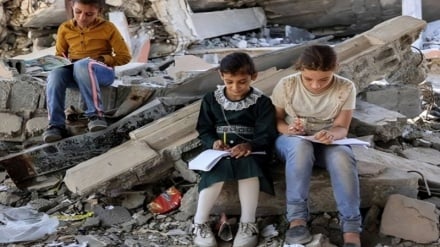What is UN Special Rapporteur's new demand from international community regarding Zionist regime?
-

Francesca Albanese, the UN Special Rapporteur on human rights in the occupied Palestinian territories
Pars Today – Francesca Albanese, the UN Special Rapporteur, has called for the expulsion of the Zionist regime's sports teams from international competitions.
According to Pars Today, Francesca Albanese, the UN Special Rapporteur on human rights in the occupied Palestinian territories, in response to the martyring of a Palestinian football player in attacks by the Zionist regime, described the regime’s actions as “genocide” and “apartheid” in a post on the social media platform X. She demanded the removal of Zionist teams from international sports competitions.
Albanese had previously condemned the killing of Palestinians by Zionist fighter jets in multiple statements. In her recent message, she wrote: “The time has come to expel the killers from sports competitions. Let’s make sports free from apartheid and genocide. One ball, one strike at a time.”
News sources reported the martyrdom of Suleiman Al-Obeid, the captain and former player of the Palestinian national football team, in an attack by the Zionist regime. The former star of the Palestinian national football team, aged 41, was martyred on Wednesday, August 6, by Zionist soldiers while waiting to receive food in the southern Gaza Strip.
In recent months, the Zionist regime, using a "humanitarian aid mechanism" designed by the United States with the participation of Tel Aviv, has been directing needy Palestinians to specific locations within the Gaza Strip and then carrying out shootings and bombings around those very centers.
In several documented cases, dozens of Palestinians waiting in lines for food and medical aid have been targeted directly by snipers or drone attacks. Human rights organizations have described this tactic as a "death trap."
In recent years, especially with the intensification of the humanitarian crisis in Gaza, a wave of global calls has emerged for sporting boycotts against Israel. These calls have been supported by grassroots organizations, human rights groups, and even some governments and international bodies.
These boycotts are part of a broader movement pursued across cultural, scientific, economic, and political fields as well.
In May 2024, the Asian Football Confederation called for the expulsion of Israel from FIFA, but this request has yet to receive an official response from FIFA.
Indonesia was stripped of its right to host the 2023 Under-20 World Cup due to its opposition to the participation of the Israeli team. This move received widespread popular support within the country and became a symbol of solidarity with Palestine.
However, over the past several decades, during various Olympic Games—including Munich 1972, Montreal 1976, and Sydney 2000—some countries had called for the boycott of Israeli athletes.
Reactions from different countries to the sports boycotts against Israel have been highly varied and influenced by political factors, public opinion, and developments on the ground in Palestine.
In recent years, especially following the escalation of the humanitarian crisis in Gaza, these reactions have intensified significantly. This is particularly true in Europe, where public sentiment has become strongly sensitive to the presence of Israeli athletes—especially after the widespread dissemination of images depicting the humanitarian crisis in Gaza.
European football clubs have refused to sign Israeli players; for example, the transfer of Yonatan Cohen to the Polish team Legia Warsaw was canceled due to fan protests.
Voices of protest have also risen in Western parliaments, with some lawmakers calling for a review of sporting relations with Israel.
South Africa, which has a long history of opposing Israeli actions and has even filed a complaint against the Zionist regime at the International Court of Justice for violating the 1948 Genocide Convention, has called for a sports boycott of Israel.
In this context, South African athletes and civil society organizations have repeatedly demanded a boycott of Israel in international sporting competitions.
These reactions demonstrate that sports are no longer merely a field of competition but have become a platform for expressing political and humanitarian protests.
Several reasons have been cited for the sporting boycott of the Zionist regime, including the following:
War crimes in Gaza: Over 61,000 Palestinians, including hundreds of athletes, have been martyred during the 23-month-long war, and 95% of the region’s sports infrastructure has been destroyed.
The martyrdom of Palestinian athletes: including Suleiman Al-Obeid, former captain of the Palestinian national football team, who was targeted while waiting in line for food.
The role of sports in legitimizing the Zionist regime: Many believe that Israel’s participation in international sports competitions serves as a form of legitimizing the regime’s actions and should be stopped.
Of course, calls for boycotting Israel extend beyond sports and have increased sharply over the past two years amid the ongoing crimes of the Zionist regime in the Gaza war. Citizens in various countries have launched online campaigns and organized protests demanding sanctions against Israel. Some universities have also suspended scientific collaborations with Israel, reflecting the expansion of this movement beyond the realm of sports.
Previously, the United Nations had also called for intensified sanctions against Israel aimed at pressuring it to end the Gaza war. In mid-June 2024, Michael Fakhri, the UN Special Rapporteur on the Right to Food, stated: “What we need now is to impose economic and political sanctions on Israel.”
The UN Special Rapporteur on the Right to Food emphasized the necessity of imposing economic and political sanctions on Israel, given the ineffectiveness of political pressures and the repeated requests made to Tel Aviv to stop the Gaza war and genocide against the oppressed people of Gaza, which have gone unanswered.
In fact, since the Zionist regime’s attacks on the Gaza Strip following the Al-Aqsa Storm operation on October 7, 2023, the landscape for the movement supporting sanctions against this regime has undergone a major shift. As a result of this operation and the subsequent Gaza war, some of the long-term goals of the Israel boycott movement and pro-Palestinian organizations have been achieved.
Now, in the twenty-third month of the Gaza war, with the expansion of sanctions against Israel across various fields—including Western countries such as those in Europe and also in Latin America—the nightmare of the Zionist leaders regarding the deepening isolation of the regime has come to fruition.
MG


